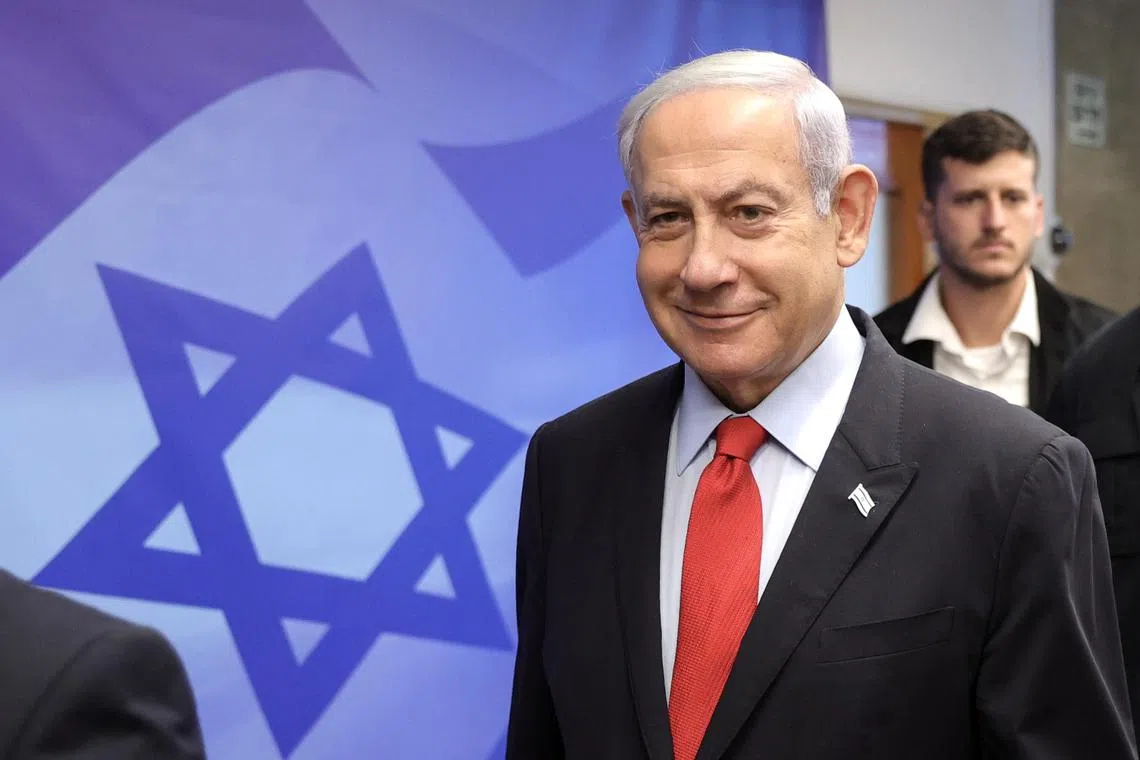US, Saudi talks on potential Israel normalisation intensify
Sign up now: Get ST's newsletters delivered to your inbox

Israeli PM Benjamin Netanyahu has said closer relations would benefit his country and Saudi Arabia economically.
PHOTO: EPA-EFE
Follow topic:
WASHINGTON – Talks between Saudi Arabia and the United States about the kingdom formally recognising Israel have intensified, according to people familiar with the discussions.
However, they said there is still plenty to negotiate and no guarantee of success.
Israeli assets rose after the Wall Street Journal, citing US officials, reported Washington and Riyadh had agreed on the broad outlines of a deal.
The officials warned they faced long odds, but were hopeful they could decide on “finer details” within a year, the Journal reported.
Th details of any agreement must be decided by the two countries involved, a spokesman for the US National Security Council said.
Saudi Arabia’s Foreign Ministry did not respond to requests for comment.
“We are waiting for the Americans to give us a complete plan regarding Saudi normalisation,” Mr Tzachi Hanegbi, Israeli national security adviser, said to journalists on Monday.
“Their main request is a defence pact with the US. The Americans have been totally transparent with us throughout. We expect to see a proper plan or proposal by the end of the year.”
Israeli Prime Minister Benjamin Netanyahu told Bloomberg on Sunday his country and Saudi Arabia would deepen economic and business ties even if they do not formally recognise each other.
Still, a deal would have “enormous economic consequences for investors”, Mr Netanyahu said. “If they had to bet on it, right now I’d bet on it. But I can’t guarantee it.”
The shekel strengthened and stocks in Tel Aviv advanced on the WSJ report.
A potential agreement could boost investor confidence in the country at a time when the government’s plans to overhaul the judiciary have triggered mass protests and a selloff in financial markets.
The currency gained as much as 0.8 per cent to 3.69 per US dollar, while the equity benchmark rallied 1.4 per cent.
Mr Netanyahu, 73, has said closer relations would benefit Israel and Saudi Arabia economically and discourage Iran from meddling aggressively in the region, including by disrupting oil-shipping routes.
Saudi Arabia and Iran restored diplomatic relations earlier this year
But Riyadh still views Tehran with suspicion and as a geopolitical rival.
US President Joe Biden is also keen for Saudi Arabia to recognise Israel.
He sent National Security Adviser Jake Sullivan to the kingdom in July,
Riyadh has previously said an independent Palestinian state is a precondition.
It has expressed frustration in recent months over Israel’s deteriorating relations with the Palestinians – typified by the recent r aid on a refugee camp in the West Bank
Privately, the Saudis have asked for firm defence guarantees from the US, access to top-notch American weaponry and for the White House to allow it to enrich uranium domestically as part of a plan to build nuclear power plants.
Public opinion in the kingdom remains opposed to recognition of Israel.
Israel signed historic diplomatic deals with the United Arab Emirates, Bahrain, Morocco and Sudan since 2020.
But Saudi Arabia is the biggest economy in the Middle East, with the government investing trillions of dollars to diversify from oil. BLOOMBERG

